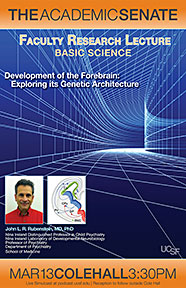56th Annual Faculty Research Lecture in Basic Science
Awarded to John L.R. Rubenstein, MD, PhD
The Academic Senate is pleased to announce the selection of John L.R. Rubenstein, MD, PhD, as the recipient of the 56th Faculty Research Lecture (Basic Science). Dr. Rubenstein is currently the Nina Ireland Distinguished Professor in Child Psychiatry and will be lecturing on "Development of the Forebrain: Exploring its Genetic Architecture".
Lecture Title: Development of the Forebrain: Exploring its Genetic Architecture
Date/Location: March 13, 2013 from 3:30 – 5:00pm in Cole Hall at the Parnassus Campus
Live Simulcast: http://lecture.ucsf.edu/ETS/Play/b7e4a7f038ea4c398f3ac8ee5fc2b98d1d

The Academic Senate Faculty Research Lecture will be held in Cole Hall at the Parnassus Campus on Wednesday, March 13, 2013, at 3:30 p.m. The event will also be "live simulcast" for viewing from your office or computer.
His research examines the regulatory genes that orchestrate development of the forebrain, with a focus on the cerebral cortex and basal ganglia. Dr. Rubenstein’s groundbreaking research and observations have provided the foundation for numerous other researchers focusing on the nature and etiology of a host of diseases that arise from dysfunction of cortical chemistry and circuitry.

In the mammalian embryo, the forebrain is the portion of the neural tube where stem cells are organized to form the cerebral cortex, the basal ganglia and other components of the adult brain -- the structures of the human brain control key functions such as speech, language, cognition and fine motor skills. Dr. Rubenstein and his lab have demonstrated the role of specific genes in regulating neuronal specification, differentiation, migration and axon growth during embryonic development and on through adult life. His work aims explain some of the mechanisms underlying human neurodevelopmental disorders such as autism and epilepsy.
Dr. Rubenstein received his MD and PhD from Stanford University. He did postdoctoral work in developmental biology at the Pasteur Institute, where he discovered that the antisense RNA inhibits gene expression, and the use of viruses to determine cell lineage. He returned to Stanford to do residencies in both adult and child psychiatry and joined UCSF in 1991. While there, Dr. Rubenstein devised a method to identify genes that are preferentially expressed during embryogenesis of the mouse forebrain, which led to the discovery of multiple genes including the Dlx2 and Tbr1 transcription factors. These were among the first discovered genes that are expressed in restricted patterns in the embryonic forebrain, and served as entry points for subsequent studies that his lab has conducted at UCSF.
Again, the Academic Senate Faculty Research Lecture will be held in Cole Hall at the Parnassus Campus on Wednesday, March 13, 2013, at 3:30 p.m. The event will also be "live simulcast" for viewing from your office or computer. For those unable to view at the time of the event, it will be recorded and made available via MyAccess@UCSF.
A reception will follow outside of Cole Hall the day of the event.
